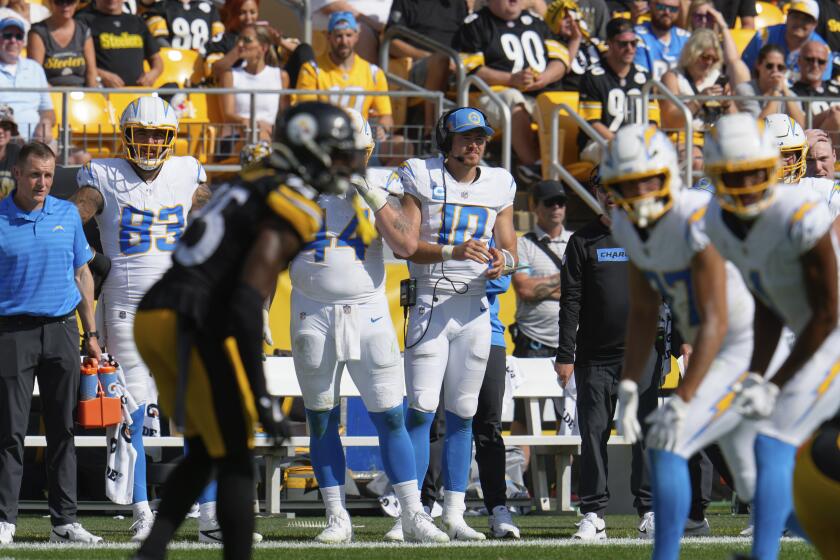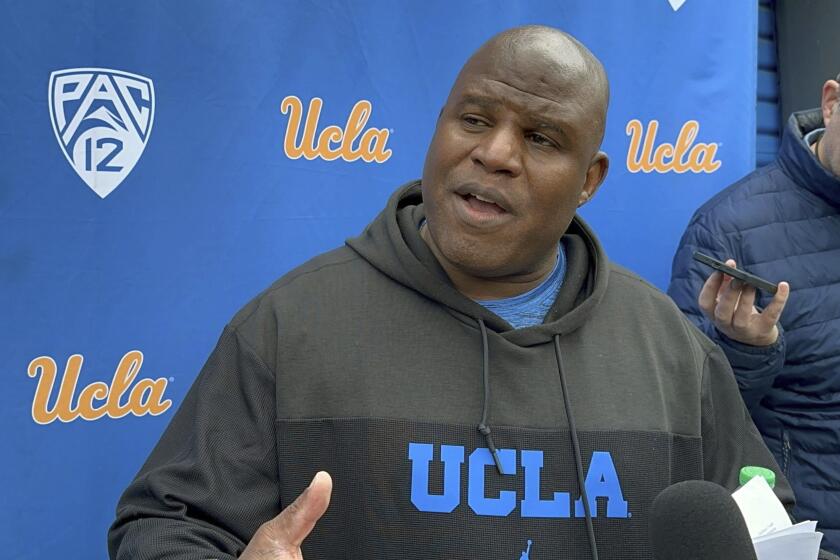Baseball’s shame is our shame too
The historian Jacques Barzun once remarked, “Whoever wants to know the heart and mind of America had better learn baseball, the rules and realities of the game.”
That, of course, is precisely why former U.S. Sen. George Mitchell’s damning report on Major League Baseball’s rampant drug abuse is dispiriting and distressing on so many levels.
The opening paragraph on Thursday’s first Associated Press story captured the essence of the thing in that stark wire service poetry:
“NEW YORK -- Seven MVPs and 31 All-Stars -- one for every position -- and that still wasn’t the worst of the long-awaited Mitchell Report. That infamy belonged to Roger Clemens, the greatest pitcher of his era.”
It’s an epoch that now has acquired its own designation: the Steroid Era.
It’s also a period in which all American professional sports declined from sports into spectacles, multibillion-dollar adjuncts of the digital entertainment industry. Stadiums and even the events themselves lost their names and became expensive billboards auctioned off to the highest bidders. A vast apparatus of sports journalism was created to provide entertaining coverage of this new industry and yet, somehow, all but a handful of lonely sportswriters seem to have missed the biggest story of their era -- the transformation of baseball clubhouses into the plush equivalent of crack houses.
That fact alone raises disturbing questions about whether most of our sporting press has become too much a part of the sports/entertainment/industrial complex to give its readers and viewers an honest account of what transpires on our courts and playing fields.
Increasingly, the vast majority of our sportswriters and broadcasters appear to have looked away while drugs corrupted the highest levels of the pastime we Americans honor with a simple appellation -- The Game.
Like the owners and managers and the coaches and the lawyers and the agents and union representatives, our sporting press looks like just another clique with a good piece of some very profitable action. All that was required to collect was a willingness to turn a blind eye to the fact the money came from letting athletes cripple and kill themselves.
Alcohol and drugs always have been a part of professional sports, but the latter usually were confined to painkillers, occasional amphetamines and quack hangover cures. As a young sportswriter several decades ago, I recall spending time with a very veteran National Hockey League defenseman, since inducted into the Hall of Fame. He was near the end of his career and had suffered a series of back injuries that probably would have crippled a lesser man. The team trainer told me that because of those injuries, simply skating was a source of constant pain to this guy.
“How do you cope with that?” I once asked him.
He grinned, his eyes twinkled and he winked at me. “Let’s just say, if I were a racehorse, they’d never let me on the track,” he chuckled.
Where there’s money on the line, that kind of corner is going to get cut, but the odd veteran weathering his injuries for another season or so is one thing. Drug use on the scale uncovered by the Mitchell Report is something of a different order of magnitude. What we’re being shown is that a stunningly large percentage of our national pastime’s highest-performing stars -- the athletes who set the pace for everybody else -- are doing it with drugs.
They’re not necessarily more talented than their peers, they’re simply more willing to risk their health and lives by screwing around with the chemistry of their blood and hormones. Maybe you do that for a home run or pitching record, but in our society at this moment, the odds are that you do that sort of thing for money.
That’s where everyone involved with Major League Baseball -- players, managers, coaches, owners, agents, lawyers, union officials, the majority of sportswriters and, even, the fans -- is complicit in all this. We’ve all turned a blind eye to what was there for anyone with eyes to see for the sake of profit and an entertaining spectacle.
Shame on every player who weakened and gave into this stuff; shame on every owner, agent or lawyer who turned a nickel’s profit from drug-fueled baseball; shame on every writer who didn’t follow up on what they had to know was happening on their beat; shame on every fan who shrugged and salivated over a new home run record.
Barzun is right about baseball’s intimacy with the American spirit. What other game ever could have coaxed poetic sentiment from both Walt Whitman and Calvin Coolidge? The game of baseball speaks to us of that idyllic national past we imagine in common. It is played in a green and open space -- as if such things were not now the luxury they are for so many. Every baseball game -- not match or contest, but game -- is rich with infinite promise, just as we believe American lives once were. We chalk the diamond’s boundaries and we allocate each game nine innings, but -- theoretically -- once the first pitch is thrown, every baseball game could go on indefinitely and every ball once hit could, if it stayed between the foul lines, remain in play forever, pursued through all eternity by some tireless fielder.
Alone among the games we play, baseball records -- and rewards -- individual effort, team play . . . and sacrifice.
Baseball’s seasonal rhythms are those of our own rural paradise lost -- hopeful promise in springtime; diligent toil through summer; harvest and reward in autumn; the warmth of well-earned rest in winter. So it was in that long ago America of our collectively imagined past. So, somehow, it seems it might be still -- or, perhaps, again -- as we sit in the sunlight and pass a couple hours of time that stands apart from normal time, watching the young, the strong and the fleet play our game.
It would be lovely to believe that honest, sober, fearless George Mitchell -- having done the impossible by bringing peace to Northern Ireland -- might now work a domestic miracle, and somehow recall us all to the memory our better sporting nature.
Unfortunately our sporting culture, like our society as a whole, has bitten too deeply into the forbidden fruit -- not the grandly evil produce of the Tree of the Knowledge of Good and Evil, but that of its stunted and stunting stepsister, the tree of profit and loss.
There may be no going back. Eden, even of the wishful sort, is closed to a people who know the price of everything and the value of nothing.
In all likelihood, the Mitchell Report will come and go and -- after a sufficient number of cosmetic public relations gestures -- everyone involved in the business of baseball will go back to doing what business does best, which is business as usual.
Shame on us, if that’s true.
More to Read
Go beyond the scoreboard
Get the latest on L.A.'s teams in the daily Sports Report newsletter.
You may occasionally receive promotional content from the Los Angeles Times.










